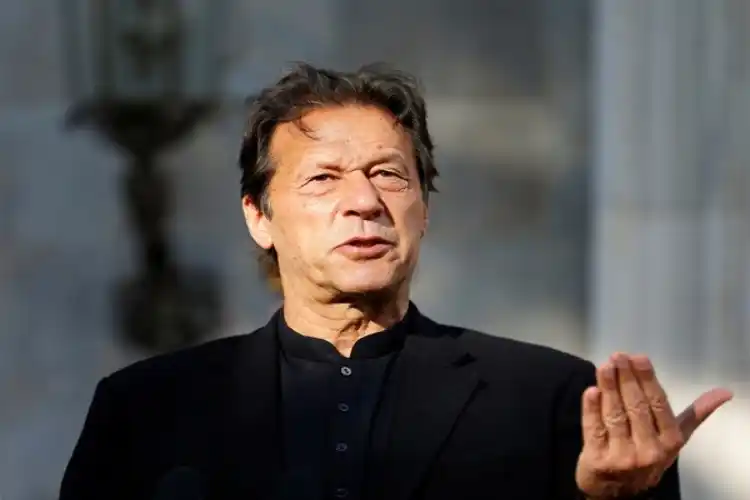
Hardeep Singh Bedi
Pakistan declined the US invitation to attend the ‘Summit for Democracy’ and skipped the virtual event that was hosted by President Joe Biden this December 9-10.
Biden invited around 110 countries, including Iraq, India, and Pakistan. Washington didn’t invite Pakistan’s ‘iron-brother’ China and instead sent an invitation to Taiwan to represent China. Russia was also not invited to the summit.
Pakistan’s Foreign Ministry released a statement saying: “We value our partnership with the U.S. which we wish to expand both bilaterally as well as in terms of regional and international cooperation. We remain in contact with the U.S. on a range of issues and believe that we can engage on this subject at an opportune time in the future.”
“Pakistan will, meanwhile, continue to support all efforts aimed towards strengthening dialogue, constructive engagement, and international cooperation for the advancement of our shared goals,” it added.
Reports in Pakistani media gave various reasons for Islamabad’s decision to ‘ignore’ the summit.
But the country’s leading English daily Dawn may have hit the nail on the head. In its report, it said, “Policymakers in Islamabad are worried that not attending the summit would give India a free hand, which already has a strong influence in the US. But a strong Chinese reaction to the US decision to invite Taiwan made it obvious that attending the summit could seriously damage Islamabad’s relations with Beijing, a risk Pakistan could not take.”
It is a telling comment that sums up that Pakistan is a sovereign nation only on paper.
Though Pakistan and China define their friendship as “higher than the heights of the Himalayas and deeper than the depths of the Arabian Sea”, it's not a secret that the successive Pakistani governments have sold the country’s interests to China.
To understand it better one has to study the China Pakistan Free Trade Agreement, 2007 wherein Pakistan reduced tariffs to zero on its imports of Chinese products resulting in a huge advantage to China, especially when the China-Pakistan Economic Corridor (CPEC) started. Interestingly, Beijing didn’t offer any tariff concession on imports from Pakistan. Now, the much-hyped CPEC is proving to be a perfect example of China’s ‘debt-trap' diplomacy.
China is forcing Pakistan to buy Chinese equipment for use in the CPEC projects and also giving loans to Pakistan to complete the purchase. This ‘debt trap’ has been killing the Pakistani economy slowly but steadily.
There is now evidence in the public domain that Islamabad has given a free pass to Beijing to loot the resources of Pakistan, especially in Balochistan and Pakistan-Occupied Kashmir.
While the Pakistani political and military leadership are the ones who are getting their share of the loot, Pakistani citizens are fooled by the fake narrative that China is the only one that can help Pakistan against India. Hence, when the Dawn says that Pakistan couldn’t afford to take a risk of irking China by attending Biden’s ‘Summit for Democracy’, it’s right.
When a country's diplomacy behaves in a manner to please another country its own sovereignty comes under doubt.
If Pakistanis want to have a look at the conduct of sovereign nations then they should study Indian diplomacy in the context of the same ‘Summit for Democracy’.
Just a few days before the US Summit for Democracy, Russian president Vladimir Putin visited India for a few hours on December 6, 2021, for the 21st bilateral Annual Summit.
The two sides signed 28 agreements, both at the government as well as at the private sector level.
Both sides shared views about the current security, political and economic situation in the world.
India is well aware of the strained Russian-US relationship and the possibility of American sanctions for buying the Russian S-400 missile system but as a sovereign nation, it not only hosted President Putin but also participated in the US Summit for Democracy.
During the meeting with the Russian President, Prime Minister Narendra Modi said, “In the last few decades, the world witnessed many fundamental changes and different kinds of geopolitical equations emerged but the friendship of India and Russia remained constant.”
Putin echoed the sentiments and said that Russia perceives India as a “friendly nation".
“We perceive India as a great power, a friendly nation, and a time-tested friend. The relations between our nations are growing and I am looking into the future," said the Russian president.
In the Summit for Democracy, Modi said, “The India story has one clear message to the world. That democracy can deliver, that democracy has delivered and that democracy will continue to deliver.”
Pakistan should have been thankful that despite being a hybrid-martial law state, the US had invited it to share the stage with the world's democracies.
Biden was indeed very generous by inviting Pakistan to the summit despite knowing very well that how Islamabad back-stabbed Washington in America's fight against terrorism in Afghanistan. Pakistan missed a golden opportunity to be in the camp of sovereign and democratic countries.
(The writer is a senior journalist)
